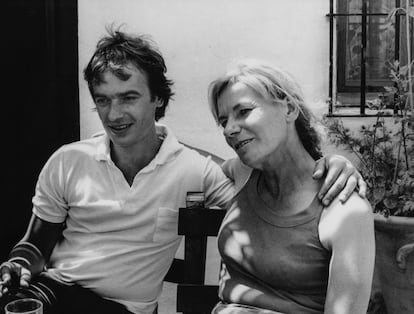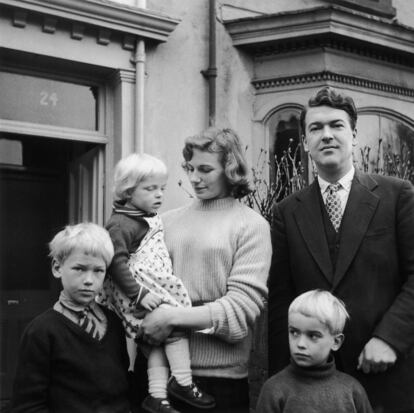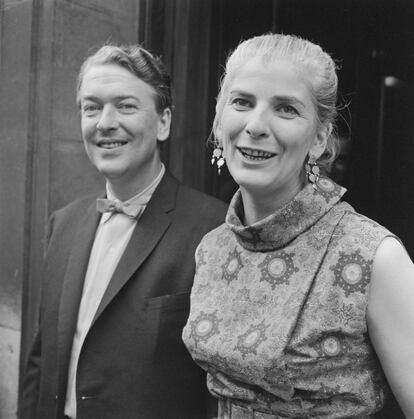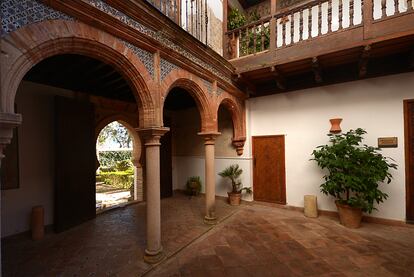Depression, passion and redemption: The mind-blowing story of Martin Amis’ mother, Hilly Bardwell
She held together a family prone to alcoholism, anger and depression (including her own) in unconventional ways. With the consent of her third husband, she cared for Kingsley Amis, the husband who cheated on her and mistreated her, during his final years. Martin Amis’ Spanish brother tells us about his mother’s life, which surpasses the fiction written by the men of the clan

*Author’s note: three years ago, I met Jaime/James Boyd, Martin Amis’ Spanish brother, through a mutual friend. This report is the result of several conversations I had with him and his entourage, in which unclassifiable moments of family life came to light. But above all, they attested to the incredible life journey of his mother, a liberated woman, an unconventional feminist, who settled in Ronda, Spain, where she found her true homeland. On the occasion of the death of Martin Amis, and with Jaime’s consent, we are now publishing this article about Hilly Bardwell.
One hot summer night in the 1970s, the young American students staying at the Mondragón Palace in Ronda got quite a fright. Two women--one with a thick Andalusian accent and the other with a British Kingston-upon-Thames accent—were making a tremendous racket with pots and pans in the kitchen as they waited for dinner to be served in one of the halls of the Mudejar Renaissance building. Then it was silent and the Spanish professor’s wife, an attractive blonde woman, walked through the door carrying a giant tray covered with a silver dome. As she uncovered the delicacy, they got a surprise: a four-month-old baby, completely naked and peacefully asleep, garnished with two sprigs of parsley in its ears, was what they were served for dinner! Hilly thought it was hilarious... The students thought, “surely this crazy woman doesn’t expect us to eat her child, does she?” that baby, now a 47-year-old man named James Boyd, says in a Madrid bar. His mother, Hilly, the eccentric blonde who amused herself by serving him on a tray, called him Jaime. His brother, the recently deceased author Martin Amis, called him that as well.
Hilly Kilmarnock, nee Bardwell, gave birth to both of them. But they had different fathers, with whom she had very different relationships: Martin, who barely lived with her, went to see her in Andalusia in the summers when he wanted to escape the gray skies of England or when he had a bad love affair; Jaime, who grew up in Spain but returned to England when none of his relatives expected him, is the only one who can remember firsthand the follies of that family headed by his eccentric mother.
When Hilly Bardwell died at the age of 81 in Ronda, Spain, in July 2010, the Spanish press did not report her death. Having been Kingsley Amis’ wife and Martin’s mother was not newsworthy in that country. However, The Guardian, did publish an obituary entitled: “Hilly Kilmarnock obituary: Unpretentious muse and matriarch to the unruly Amis family.” Of her, it wrote: “She was funny, open, unpretentious, pretty, and liked by everyone who met her. Though her life was not always easy or orderly, she managed it bravely and originally.” Her son Jaime explained his mother’s originality: “She organized lunches every Sunday, she always loved being surrounded by people and hustle and bustle. She was a mental horndog. And while she did settle here, in a way, she was always a nomad. I now live in the house in Ronda where I grew up with her, and she used to say to me: ‘Jaime, why don’t you buy me a caravan, and I’ll live there [in] the garden.’” Her son Martin remembered her vividly in Experience: “There were many reasons why my mother loved living in Spain and the fact that you could freely buy amphetamines in most pharmacies was not the least of them. At one point the authorities banned their sale without a prescription, and she had to put on ten layers of clothes and pretend she was obese [...] We knew when my mother was ‘on amphetamines’ because she would suddenly start cleaning and rearranging the house like crazy.”

Hilly was always a bohemian. The daughter of an agricultural engineer, she went to school at Bedales, a sort of Free Institution of Education where women escaped the puritanism inherited from the Victorian era. As soon as she began her studies at the Ruskin School of Art in Oxford, she fell madly in love with a charismatic student from the neighboring Saint John’s College, Kingsley Amis. He was also a hooligan and womanizer. He was such a selfish guy, Hilly would recall years later, that after every date she took him home, because he was afraid of being mugged. She got pregnant by him when she was 17; when he heard the news, he wrote to his best friend to say, “I don’t want that disgusting child.” In fact, he tried to get her to have an abortion. The best friend to whom Kingsley Amis wrote was the poet Philip Larkin, who interceded for the baby; the couple later named their baby Philip, in his honor. Their son Martin was born a year later; their daughter Sally followed. Larkin was a constant presence in the couple’s early years; he adored Hilly, whom he once described as “one of the most beautiful women I have ever known, without being pretty at all.” That was no exaggeration; decades after Kingsley cruelly abandoned her after years of scorn and despotism, Hilly agreed to care for her ex-husband in his later years because their son Martin asked her to do so.
Kingsley drank half a bottle of scotch every night and sometimes it went well and sometimes it went badly. I fought with him every time he fought with my mother. I defended her at all costs
Early in their marriage, Amis and Bardwell experienced lean, cold and sometimes hungry years. She would steal leftovers from the coffee shop where she worked in the evenings, which was essentially the family’s entire livelihood. Kingsley, still a budding author, had a lectureship at Swansea University College and was writing. But he was not yet the Apostle of Angry Young Men, one of the best English authors of the second half of the twentieth century, as The Times would later call him. He was already showing signs of his legendary alcoholism. And yet they were happy, or so Hilly recalled. “We saw the funny side of everything,” she explained to her first husband’s biographer. When Kingsley published his first novel in 1954, Lucky Jim, fame and money followed, but paradoxically, everything got worse. They organized epic parties with lots of alcohol at their home. Kingsley invited all the women in attendance to go to bed with him; Hilly did not remain a wallflower. In one of his novels, Amis even insinuated that Sally was another man’s daughter. During these tremendously chaotic years, Kingsley gained entry into the select circles of Cambridge and Princeton. There, he met the novelist Elizabeth Jane Howard, for whom he left Hilly.
One could say that this romance was the origin of the Amis’ link with Spain.
For Hillary Bardwell, Spain had always represented freedom. When she learned that her husband was cheating on her, she gathered the money and the courage to move to Mallorca, her dream destination, with her three children because she had never stopped fantasizing about a nomadic life. Kingsley did not want to follow her: he was staying with “the new one.” Hilly plunged into a deep depression. She hit rock bottom one night, when she was found unconscious, full of pills and alcohol. Martin and Philip returned to her father and his new partner. Sally stayed with her grandmother. Somehow, it had been proven that she could not keep custody of the children. But after a while, the still-lively Hilly began to rebound from her depression. She met her second husband, a Cambridge classics professor named Shackleton Bailey. In the late 1960s, the couple moved to the United States, where Bailey was a professor of Latin at the University of Michigan. For her part, the brave and eccentric Hilly opened a fish and chip shop. She named it Lucky Jim, after Kingsley’s first novel.

And then on a trip home to see her children, she met her third husband, Alistair Boyd, the seventh Baron Kilmarnock, Martin Amis’s stepfather and Jaime’s father. As Hilly herself recounted, Ali Boyd, a travel guide author and landscape painter, was “charming, considerate and possessed perfect manners,” which she was not accustomed to.
Alistair, a Hispanophile, lived between England and Spain. He had a little language school in Andalusia, in an XVI-century Renaissance palace in a town called Ronda, in Malaga, where he had stayed in 1953. He spoke perfect Spanish, but Hilly did not. But the plan to move there was a dream come true for Hilly. Moreover, Ana and Mateo, a local couple who helped her in her day-to-day life, were always by her side. When Hilly gave birth to Jaime and fell back into the same postpartum depression that had plagued her when all of her other children were born, Ana and Mateo took care of the baby. “They loved him like their own son. I’d be lying to you if I didn’t admit that sometimes I was a little jealous of him,” Rosi, Ana’s biological daughter, says of her late mother on a phone call from Ronda. But there was really no place for such jealousy in that household: Hilly treated everyone who came into her life as family; Rosi was also like a daughter to Hilly. “She was hilarious; she didn’t speak a word of Spanish, but she understood my mother perfectly. I don’t really know how they did it. It was always good fun, with that sense of humor of hers,” says Rosi, laughing. At the same time, the Amis matriarch never neglected her relationships with her children by Kingsley: Martin, Philip and Sally would go to Spain to spend long periods of time with them. In fact, Martin enjoyed the hospitality of his mother and her new husband when he wrote his first novel at Mondragon Palace, where the days were filled with laughter, dinners, meals and drunkenness.
When Hilly’s postpartum depression passed, life in Andalusia started to improve: the Kilmarnoks bought a small farm on the outskirts of the village where they had a mare named Babieca, Babi, whom Jaime rode whenever he wanted. Now, the only difficulty was Sally, who had inherited an alcoholic tendency from her father. As Jaime explains, “My sister settled in Ronda and opened a bar right next to the school. It became tremendously popular for two reasons: first, because she was very beautiful, but also because when she got drunk, which was very often, she gave away free drinks... The bar failed. The school—not that it was the most organized educational institution in the world—didn’t do well either. Hilly and Alistair had to sell Mondragon and move to the little farm. She didn’t mind at all: she was happy taking care of her chickens and living the country life... Sometimes we bathed in a basin with cold water and cooked with camping stoves.”
Who was going to take care of him now? He didn’t even know how to fry an egg by himself
It was only when Alistair, the Baron of Kilmarnock, got a seat in the House of Lords that the household started to receive income. He began to spend time in England while Hilly stayed in Ronda. During that period, they sent each other love letters that Jaime still has today. In the missives, Alistair confessed that he missed her, while Hilly filled pages with erotic drawings, dirty jokes and the characteristic dark humor that had also stolen her first husband’s heart.
During this time, Hilly’s first husband, Kingsley, who was already a celebrity in English literature, unexpectedly came back into Hilly’s life. The woman for whom Kingsley had left Hilly, Elizabeth Jane Howard, left him. Kingsley was ailing, alcoholic, and insufferably misanthropic. Who was going to take care of such a mess? He couldn’t even fry an egg on his own. Martin, who was well aware of his mother’s precarious financial situation, had an idea: what if we asked Hilly to be his paid caregiver? And so Hilly, Ali and Jaime moved from sunny Ronda to the bottom floor of Kingsley Amis’ house in Kentish Town, London. “It was an unconventional proposition, very true, [but] so were they. We all thought the arrangement could work for about six months or even a year,” Martin recalled gleefully years later. But it lasted fifteen years. “It was a very strange situation that was managed extraordinarily well. My mother did everything from preparing his meals to being his companion when they went to restaurants and events. She also organized the office, interviews, radio shows and all those things...,” says Jaime, who does not have such an idyllic memory of that arrangement. It was hard for Jaime to return to England, lose his freedom and adapt to the climate and customs of an essentially bleak country. And his stepfather Kingsley was not exactly an easy man to get along with: “Like so many intellectuals, he had no time for nonsense. If he got bored with you, he could be very rude. Generally, he and my mother got along well, but Kingsley drank half a bottle of scotch every night. Sometimes it went well and sometimes badly. When it went wrong, he was intolerable. I fought with him every time he had a fight with my mother because I didn’t agree with what was going on in that house. I defended her at all costs,” Jaime recalls.
There was never a dull moment in the Amis/Kilmarnok household. “My brothers were always running around getting laid. Philip [Amis] would fall into periods of depression and stay in the room next to mine. He had a very tumultuous relationship with my mother…He blamed her and Kingsley for his life being a mess because of the childhood he’d been given. From time to time, Sally would come in drunk and beg for money. She was in and out of the rehab center all the time. More than Kingsley, my father was the one who was looking out for them, but he did it with love. My siblings have always respected my father for that; he knew how to be there [for them] but not meddle,” recalls Jaime. He says that despite it all, his father—the seventh Baron of Kilmarnok—was never jealous. “Despite the strangeness of this living situation, each person knew his or her role. Nobody was jealous. My father and mother were obviously very much in love. Kingsley didn’t want his ex-wife back, and you could really sense that was the case.” The couple was simply there to offer a service.

What happened with Ana and Rosi? They always kept in touch. In fact, when Queen Elizabeth made Kingsley a Knight of the British Order, they both went to visit in London. “We liked the city very much. Kingsley was very nice and Philip [Larkin] was also around. We had a very good time,” Rosi recalls simply and sincerely.
When Kingsley died in 1995, the Kilmarnoks could finally return to their happy Arcadia. There, they had everything they needed. Hilly busied herself cooking and gardening. Alistair wrote his travel books and painted watercolors. “In the evenings they would have a glass of wine and lie in bed. My father would take out his notebook and my mother would help him remember things,” says Jaime, who still lives in his mother’s house. From there, he manages a travel company that aligns perfectly with his father’s vocation and organizes trips from Andalusia to Morocco. Philip Amis continued to live in the village: he moved there to make peace with his mother and never left (he passed away in February 2021). Sally stayed in England; she died in 2000, after a long struggle with alcoholism and depression. Alistair Boyd died in 2009. In 2010, Hilly passed away peacefully at her home.
That little boy affectionately remembers the woman who created that special bond between them: “Whenever there was a problem in the family she would find a way to fix it. She was not a great intellectual, but she had more emotional intelligence than any of her husbands. She wasn’t intimidated by anyone’s ego because she had no ego, she was way above that.” Jaime traveled to Florida a few weeks ago to see his brother Martin in his final moments. The writer visited Hilly in Andalusia every year.
In Experience, Martin Amis acknowledged his mother’s sacrifice, and he credits her for Kingsley’s creative rebirth: “I know you were hurt by his disdain [...] But when you took care of him, Dad wrote The Old Devils and Difficulties with Girls and The Folks that Live on the Hill and his Memoirs and A Twitch on the Thread and The Russian Girl and You Can’t Do Both and The Biographer’s Moustache and The King’s English and a few more poems. He never could have written all this without you, because you reminded him of the importance of love.”
Sign up for our weekly newsletter to get more English-language news coverage from EL PAÍS USA Edition
Tu suscripción se está usando en otro dispositivo
¿Quieres añadir otro usuario a tu suscripción?
Si continúas leyendo en este dispositivo, no se podrá leer en el otro.
FlechaTu suscripción se está usando en otro dispositivo y solo puedes acceder a EL PAÍS desde un dispositivo a la vez.
Si quieres compartir tu cuenta, cambia tu suscripción a la modalidad Premium, así podrás añadir otro usuario. Cada uno accederá con su propia cuenta de email, lo que os permitirá personalizar vuestra experiencia en EL PAÍS.
¿Tienes una suscripción de empresa? Accede aquí para contratar más cuentas.
En el caso de no saber quién está usando tu cuenta, te recomendamos cambiar tu contraseña aquí.
Si decides continuar compartiendo tu cuenta, este mensaje se mostrará en tu dispositivo y en el de la otra persona que está usando tu cuenta de forma indefinida, afectando a tu experiencia de lectura. Puedes consultar aquí los términos y condiciones de la suscripción digital.









































